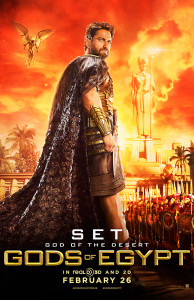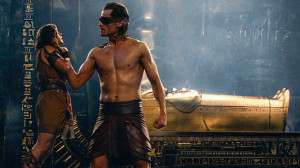 There is something very frustrating about watching a director whose career started off with such promise just crash and burn. Case in point – Australian helmer Alex Proyas. He first burst onto the scene with The Crow, a comic book adaptation that still stands out in that increasingly crowded genre. He followed that up with the science-fiction noir masterpiece Dark City and then demonstrated some range outside of genre films with the dramedy Garage Days. But ever since then, starting with 2004’s I, Robot, see our review here, Proyas has been turning in dud after dud. His latest Gods Of Egypt does nothing to reverse that trend, if anything it double-downs on its badness.
There is something very frustrating about watching a director whose career started off with such promise just crash and burn. Case in point – Australian helmer Alex Proyas. He first burst onto the scene with The Crow, a comic book adaptation that still stands out in that increasingly crowded genre. He followed that up with the science-fiction noir masterpiece Dark City and then demonstrated some range outside of genre films with the dramedy Garage Days. But ever since then, starting with 2004’s I, Robot, see our review here, Proyas has been turning in dud after dud. His latest Gods Of Egypt does nothing to reverse that trend, if anything it double-downs on its badness.
In the earliest days of ancient Egypt, the gods have been living among the mortals. After a long reign, Osirus has decided to step down from his throne as King of the land, handing things over to his son Horus (Nikolaj Coster-Waldau). This upsets Osirus’s brother Set (Gerard Butler) who feels that the crown should go to him. He says as much at Horus’s coronation before he kills Osirus, plucks out Horus’s eyes in mortal combat and seizes power. Fast forward a year to a land where all are slaves to Set. Plucky young thief Bek (Brenton Thwaites) is goaded by his love Zaya (Courtney Eaton) into breaking into Set’s treasure vault to steal back Horus’s eyes to give to the dethroned god now hiding in exile. Once past a series of traps that would seem familiar to anyone who has seen Raiders Of The Lost Ark, Bek is able to find and secure just one of the Eyes. With Zaya killed in the getaway, Bek must convince a sulking Horus to not only return to free the enslaved Egyptians, but to find a way to bring Zaya back from the Underworld.
Gods Of Egypt has a budget of $140 million. In and of itself, not a bad thing. That amount of money has been spent in service of a number of fine films, and Proyas makes sure every penny is on screen. Visually, there is plenty of imagination on display from the small details like the gods’ golden blood to the majesty of Ra’s sky chariot hauling the sun across the heavens. One of the traps that Bek must clear is a pyramid’s constantly shifting interior that looks like the always moving stairs and hallways of Harry Potter‘s Hogwarts on a bad acid trip.
 Unfortunately, all of the lush visuals created are in support of a story that is monumentally rote. The movie wants to be a throwback to the fantasy adventure films of the 1950s and `60s, the kind where a mythical hero like Jason or Sinbad would go against the gods to complete some quest. But aside from periodically demoting the heroic human to sidekick of the questing god, Gods Of Egypt doesn’t bring anything new or interesting to the formula. You can practically see the boxes being checked off by the screenwriters as the film unfolds – Set piece. Set piece. Start the ticking clock. Set piece. Raise the stakes. Characters begin to begrudgingly respect each other. Wash. Rinse. Repeat.
Unfortunately, all of the lush visuals created are in support of a story that is monumentally rote. The movie wants to be a throwback to the fantasy adventure films of the 1950s and `60s, the kind where a mythical hero like Jason or Sinbad would go against the gods to complete some quest. But aside from periodically demoting the heroic human to sidekick of the questing god, Gods Of Egypt doesn’t bring anything new or interesting to the formula. You can practically see the boxes being checked off by the screenwriters as the film unfolds – Set piece. Set piece. Start the ticking clock. Set piece. Raise the stakes. Characters begin to begrudgingly respect each other. Wash. Rinse. Repeat.
But a weak storyline is not the only problem the script has. The dialogue in Matt Sazama and Burk Sharpless’s screenplay oscillates back and forth between a somewhat more stylized form and a more anachronistic, modern style. Now, if the varying styles were used to mark the difference between the gods and mortals, with Horus and his ilk speaking more formalized while Bek and the rest of the mortals spoke in an earthy, more informal, modernistic patois, that would be an interesting and good choice. But no, gods and mortals alike have speech patterns that frustratingly fluctuates in style. Additionally, the script’s comic relief beats, at least I think they are comic relief beats, fall flat.




Jeff Beard liked this on Facebook.